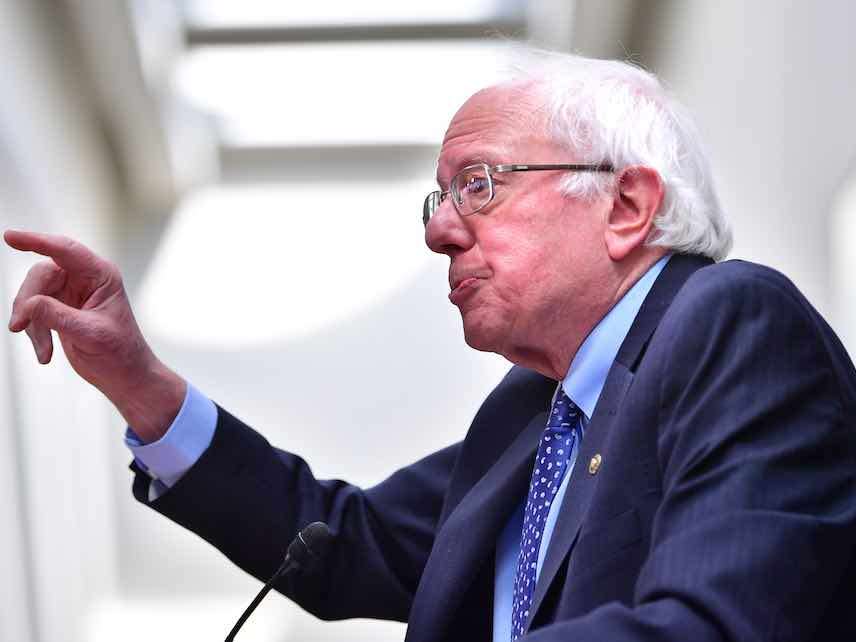Bernie Sanders Articulates His Libertarian Foreign Policy During CNN Townhall: Reason Roundup
Plus: Sanders on democratic socialism, Medicare for All, and what to do about Venezuela

Sen. Bernie Sanders (I–Vt.) answered audience members' questions about his policy views at a CNN townhall event Monday night, touting Medicare for All, free college tuition, and higher taxes on the wealthiest Americans—none of which are new or surprising political positions for the 2020 Democratic presidential candidate.
"I believe that healthcare is a human right, not a privilege, and we've got to guarantee healthcare to all our people as a right," said Sanders at the event, which was hosted by Wolf Blitzer.
During one of the more interesting moments, an audience member asked Sanders to explain why he believes socialism is better than capitalism. Sanders quickly asked the audience member to clarify that she meant democratic socialism rather than full-on socialism. Sanders was only game to defend the former, which he defined as "having, in a civilized society, the understanding that all of our people live in security and dignity." This, of course, is the watered-down and inoffensive definition of democratic socialism that Rep. Alexandria Ocasio-Cortez (D–N.Y.) has used when pressed.
Sanders made clear that when it comes to domestic issues, he thinks more government intervention is the answer to every public policy question. But on international affairs, the independent Democrat took a very different tone. As the townhall turned toward foreign policy, Sanders sounded downright libertarian. Sanders decried the humanitarian crisis in Venezuela and chided the regime of President Nicholas Maduro, whose government is no longer recognized as legitimate by the United States.
"What's going on in Venezuela is terrible," said Sanders. "People are living in hunger. I strongly believe there has to be an international humanitarian effort to improve lives for the people. I think the evidence is pretty clear the last election was not a free and fair election."
But Sanders did not believe the U.S. military should intervene in the country, in part because of the U.S.'s long and sordid history of making things worse.
"I'm old to enough to remember the war in Vietnam, and I was as active as I could, trying to keep the US from going to war in Iraq," said Sanders. "I think sometimes you have unintended consequences when a powerful nation goes in and tells people who their government will be. My view, whether it is Saudi Arabia, which is a despotic regime, or Venezuela, I think we've got to do everything we can to create a democratic climate, but I do not believe in U.S. military intervention in those countries."
And in a true display of principle, Sanders offered measured praise for President Trump's decision to meet with North Korean dictator Kim Jong-un.
"I think the idea of going and meeting face-to-face with your adversaries is a good idea," said Sanders. "I would like the president of the United States to bring Iran and Saudia Arabia together, to bring the Palestinians and Israel together. So I wish the president the best of luck. This is a very important issue, and if we can get nuclear weapons out of the hands of Kim Jong-un that would be a very good thing."
Sanders' noninterventionist foreign policy stands in stark contrast to his hyper-interventionist domestic policy. Still, it was refreshing to hear a Democratic presidential candidate concede that Trump's break with the (often bipartisan) hawkish consensus in Washington, D.C., is good news.
FREE MINDS
Speaking of Venezula, Maduro's government briefly detained several Univision journalists. Univision's Jorge Ramos was interviewing Maduro, who apparently took umbrage at a certain line of questioning and decided to prematurely end the conversation. Later, his staff took Ramos's phone away. The ordeal lasted three hours, according to CNN.
Ramos says he showed Maduro video of desperate people "eating from a garbage truck." And "when I showed him these images, he said that the interview was over." (Translated from Spanish) https://t.co/9LUC9v5biY pic.twitter.com/hDATQKjzfr
— Brian Stelter (@brianstelter) February 26, 2019
FREE MARKETS
Sanctions may have failed to cripple North Korea's economy, according to several analysts and prominent defectors quoted by The Wall Street Journal, which notes that "about 70% of North Korea's economy is now market-based, according to estimates from Kwak In-ok, a North Korea economy researcher at Sookmyung Women's University in Seoul. As sanctions have tightened, he said, illicit trade has expanded, helping to keep businesses running." More:
North Korean households now generate more than 60% of their income from informal market activities, according to Mr. Kim at Seoul National University in his recent book, "Unveiling the North Korean Economy."
Some residents pay fees to be exempt from showing up to their official state-assigned jobs, which offer paltry salaries. They then make money in the informal market economy, and hand over a portion to their official job's manager, who doesn't report their absence to higher officials, according to former residents and researchers.
One North Korean escapee who left the country in 2017 said he made a living by setting aside some shrimp and fish he caught while working at a seafood company to sell through the black market. Other families he knew made shoe soles and sold them to other families that made shoe tops.
"It's all capitalism there now," he said of North Korea.
Capitalism, it would seem, finds a way.
QUICK HITS
- The Senate just might come out against Trump's declaration of a national emergency on the U.S. southern border. Republican Sens. Thom Tillis (R–N.C.), Lisa Murkowski (R–Alaska), and Susan Collins (R–Maine) are likely to oppose it.
- "The secret lives of Facebook moderators" are pretty miserable, and make a strong argument that there are some jobs that no human being should have to do. Luckily, there's such a thing as automation.
- Another high-profile hate crime looks like a hoax.
- Today in Everyone Is Offended: "Chris Evans Helping Regina King Up the Oscars Steps Sparked a Debate About Male Feminism."


Show Comments (208)